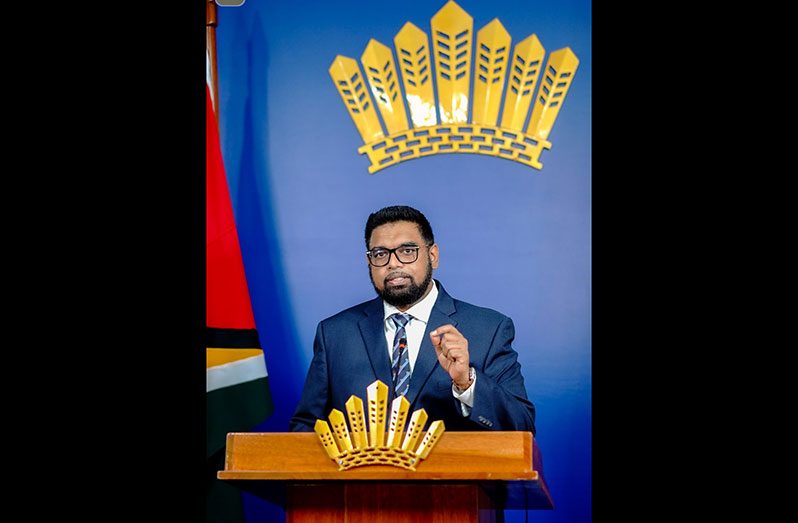PRESIDENT, Dr Irfaan Ali, on Tuesday, proposed that the Caribbean Community (CARICOM) should develop its capacity to produce vaccines for COVID-19 and other illnesses.
In an invited comment, he recalled the difficulties faced by the region in acquiring COVID-19 vaccines and underscored the importance of putting systems in place to ensure a different outcome in the future.
President Ali is attending the 33rd Inter-Sessional Meeting of CARICOM Heads of Government in Ambergris Caye, Belize.
The Guyanese President said that CARICOM should follow the direction of the Community of Latin American and Caribbean States (CELAC), whose membership decided to examine the prospect of building capacity to manufacture its own vaccines.
“I think as a region, as CARICOM, we must send a signal to the private sector and development agencies through a collective discussion that we are also going to pursue this path of building the capacity.”
He added that COVID-19 vaccines are one of many that can be produced in the region and that Guyana is ready to play its part.
“I want to really put on the table, the idea of us sending a stern signal that we are willing, as a region, to work towards this direction. Guyana is willing to support and willing to provide the foundation.”
President Ali also noted that vaccine manufacturers India and China have already expressed their interest in being a part of the process.
“It is for us to send the signal and we must make that decision.”
The President said that since the Caribbean Development Bank was present at the Heads of Government meeting, it should be asked to examine the financial and social viability of developing the region’s capacity. The region, he added, must be proactive about the future of its people.
REGIONAL STRATEGY
President Ali said he endorsed the development of a regional strategy to deal with the pandemic.
He noted that such a strategy would help to mitigate the financial and social risks of nations. Guyana had its first COVID-19 case on March 11, 2020, and since then has recorded over 62,700 cases (8.2 per cent of the population) with a recent decrease in infection.
During this time, the government, like the rest of the world, has been forced to navigate through uncertainty. On February 11, 2021, the vaccination process started and with a central focus on protecting its citizens, the government has been able to, in a little over a year, inoculate over 431,000 (84.1 per cent) adults with their first dose and 326,375 (63.6 per cent) with their second dose.
For ages 12 -17, Guyana has administered 33,445 (45.9 per cent) first dose and 24,104 (33 per cent) second dose.
The cumulative booster doses are 49,517.
The country’s testing capacity has also improved dramatically from five tests per day in the early pandemic.
In 2020, a total of 38,548 tests were done; in 2021, 387,266 tests were done and up to last Monday, 103,896 tests have been done so far for 2022.



.jpg)








